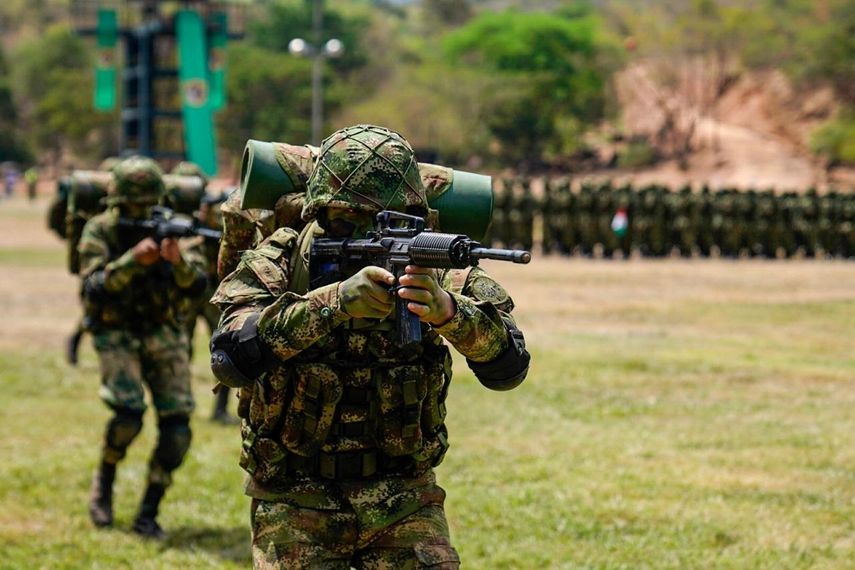In reaction, the Israeli government accused Colombia to be on the side of Hamas. According to the Colombian Foreign Ministry, diplomatic officials who are in Israel will return to the country and Colombian citizens in Israel and the Palestinian territory will receive assistance in the consular section of the embassy in Tel Aviv.
Both countries established diplomatic relations in 1957 and since then they have signed dozens of agreements and instruments on political and economic matters – including a free trade agreement -, education and technical cooperation. However, the closest relationship is the military one.
Although it is not the first country in Latin America to break relations with Israel, Colombia’s decision raises questions about how it will affect the security capacity of its military forces to combat illegal armed groups, given the agreements that the country maintains with Israel for the acquisition and maintenance of aircraft and weapons.
Bolivia, which made the same decision last October, did not depend on Israel in that regard, in which it is closer to Iran.
The Associated Press explains what the relationship between Colombia and Israel consists of and how it could be affected by the diplomatic breakup.
Israel’s cooperation with Colombia
Colombia has about 22 KFIR model aircraft, Israeli-made fighter-bombers, which have been part of the country’s attack and air defense fleet since the 1980s. The Colombian military also uses 5.56 mm Galil rifles. of Israeli manufacture and of which Colombia acquired the rights for its manufacture and marketing.
Added to this are cybersecurity, intelligence and military material agreements for border protection.
The useful life of KFIRs is approaching its end and they require maintenance to keep them operational. Although Colombia has received offers to replace them from countries such as France, Sweden and the United States, no agreement has been finalized so far. Defense Minister Iván Velásquez told Congress on Tuesday that the acquisition process will only be activated if the president so decides.
The Colombian Air Force has justified that Israel Aerospace Industries LTD (IAI), domiciled in Israel, is the exclusive supplier for the KFIR.
In addition to the Israeli KFIR, Colombia has problems with part of the MI-17 fleet, Russian-made helicopters used for supply and movement of troops, which are grounded due to lack of maintenance, due to the suspension of contracts with Russian companies. following the war with Ukraine, according to the government.
Current contracts between both countries
Neither the Colombian nor the Israeli government has specified the extent of the break in relations. The Colombian Foreign Ministry indicated in a statement that “all communications related to this announcement will be made through established official channels and will not be public.”
When consulted by the AP, the Israeli Embassy in Bogotá declined to comment on the matter and the Colombian Foreign Ministry did not immediately respond.
However, one day before Petro’s announcement about the break in relations, the Minister of Defense explained to Congress that the current contracts with Israel will be fulfilled. Among them, the maintenance and logistical support for the KFIR aircraft, as well as the Barak missile systems, which includes a contract of 131 million dollars valid until 2026.
Velásquez added that they seek to “diversify” suppliers to avoid depending on Israel, which is why they formed a “transition” committee for the replacement and diversification of the sector’s capabilities, as well as the development of a 5.56 mm caliber rifle. by the Colombian Military Industry that they seek to convert into the main supply weapon to replace the Galil.
What will happen to the agreements?
For retired General Guillermo León, former commander of the Colombian Air Force, capabilities will be affected whether Colombia definitively breaks cooperation and suspends contracts, or if it complies with current contracts but refuses to sign new ones.
“At the end of the year, maintenance and spare parts run out and from then on the fleet, in an accelerated manner, would enter a condition where we would no longer have the means to sustain it… This year three aircraft were withdrawn from service due to compliance with the life cycle. useful,” León told the AP.
In the case of the Galil rifles, the former commander added, there will be an impact because although they are manufactured in Colombia, specific parts such as the barrel are exported from Israel.
The extent of the breakdown in relations is uncertain, especially since previous security announcements did not completely stop security cooperation.
Israel reported in October that it would stop security exports to Colombia, after Petro compared Israel’s actions in the Gaza Strip to Nazi concentration camps. In February, Petro announced the suspension of arms purchases from Israel. However, according to the Colombian Ministry of Defense, the tensions have not caused the early termination of the opposing parties, but rather the signing of new ones.
The two countries also did not specify whether the diplomatic break will mean a change in the commercial relationship. However, there is a Free Trade Agreement at stake that came into force in 2020 and entails tariff advantages for exports.
Colombia exports coal, coffee, flowers, sweets and parts for airplanes and helicopters to Israel. According to the Colombian Ministry of Commerce, last year sales to that country reached 499 million dollars, which represented a 53% drop compared to the previous year.
On the other hand, Colombia buys machines, electrical equipment, plastics and their raw materials, fertilizers and manufactures from Israel. In 2023, imports from that country represented 90 million dollars, 54% less compared to 2022.
Source: AP




